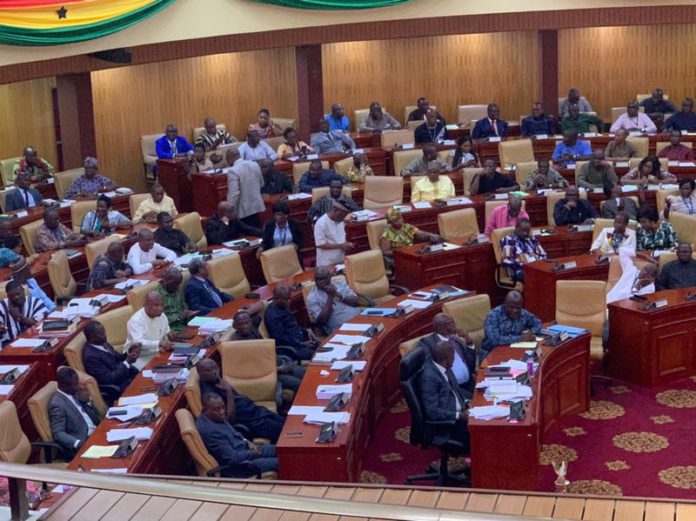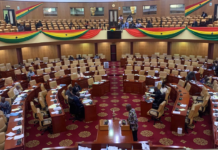
A Private Member’s Bill proposing an amendment to extend maternity leave from three months to four months has been laid in Parliament.
The Bill, which is seeking to amend the Labour Act, 2003 (Act 651), is also proposing an option for an additional two weeks of maternity leave in the case of a caesarean section (CS), stillbirth(s), or multiple births.
The Labour (Amendment) Bill, 2023, also known as parental leave for all, is also pushing for the introduction of paid paternity leave for men for a minimum of seven days and a maximum period of four weeks, with the option of an additional two weeks in case of caesarean, stillbirth(s) or multiple deliveries of spouse and to provide for related matters.
It is aimed at allowing new mothers adequate time to give birth, exclusively breastfeed, care for and bond with their new baby, as well as recover before returning to work.
The essence of paternity leave is to enable men to take care of their wives and assist the new mothers with domestic chores.
The National Democratic Congress (NDC) Member of Parliament (MP) for Madina, Francis-Xavier Sosu, who is sponsoring the Bill, submitted it to the Clerk-to-Parliament on Friday, October 6, 2023.
A memorandum accompanying the proposed Bill said in November 1919, a little over 100 years ago, the first steps were taken to ensure the protection of pregnant women at work with the adoption of the Maternity Protection Convention at the International Labour Conference, the first gender equality international labour standard.
It said the convention recognized the right to paid leave in relation to childbirth with employment protection.
Thus, maternity protection was one of the primary concerns of the International Labour Organisation (ILO), the memo said.
In Ghana, the MP said, the current maternal mortality rate was 350 out of 100,000 live births as of August 2022, less than the World Health Organisation (WHO) accepted standard of 70 out of 100,000 live births.
Citing the Greater Accra Regional Hospital (Ridge), he said a majority of maternal deaths were as a result of bleeding during or after childbirth.
“As a result, the WHO recommends that pushing maternity leave to six months in order to allow for exclusive breastfeeding should be a priority, an assessment agreed to by the Ghana Medical Association.
“Thus, the purpose of maternity leave is to give new mothers adequate time to give birth, recover, care for, and bond with their new baby before returning to work as the period of exclusive breastfeeding is important in ensuring that mothers are able to provide their children with adequate care,” he said.
Silence of law
Furthermore, Mr. Sosu said, for Ghana, Act 651, specifically section 57(3), addressed scenarios where women underwent CS or gave birth to multiple babies in addition to providing women with a 12-week maternity leave period to nurture their newborns and recover after delivery.
“It stipulates that ‘Maternity leave can be extended by a minimum of two extra weeks in cases of abnormal confinement or when two or more babies are born during the same confinement. However, the law remains silent on the situation of women who unfortunately lose their babies during pregnancy or delivery,” he said.
Mr. Sosu argued that, the absence of specific provisions in the Ghana Labour Law to address or offer support for women grappling with the loss of pregnancy or babies was a big challenge, underscoring the pressing need to initiate conversations and consider potential reforms that extended compassionate support for women during their times of vulnerability.
In addition, he said, the physical and psychological pressure of such losses could be great since the body and mind often went through significant changes in preparation for childbirth.
He said amid the heart-wrenching scenario of a woman giving birth and subsequently losing her baby, there had also been concerns about her entitlement to maternity leave days.
“This issue has sparked debates that delve into the fundamental purpose of maternity leave, questioning whether or not they are tied exclusively to the presence of a baby and not necessarily to the mother.
Indeed, while some argue that the absence of a living baby negates the need for statutory maternity leave, others assert that the act of childbirth alone warrants the full duration of maternity leave for mourning and healing, regardless of the baby’s survival duration,” he argued.
GEA’s position
In May 2017, he said, the Ghana Employers Association (GEA) proposed an extension of the country’s maternity leave from the current 12 weeks to 14 weeks.
The GEA’s call followed moves from various stakeholders to extend the leave period to enable women to undertake exclusive breastfeeding and recover before resuming work.
Globally, Mr. Sosu cited some countries with the longest maternity leave.
He named them as Bulgaria at 58.6 weeks at 90 percent pay, Canada at 50 weeks at 55 percent pay, Croatia at 30 weeks at 100 percent pay, Czech Republic at 36 weeks at 70 percent pay, Greece at 43 weeks at 54.2 percent pay, and Iceland at 26 weeks at 80 percent pay.
He mentioned others as Norway at 59 weeks at 80 percent pay and 49 weeks at 100 percent pay, Sweden at 34.2 weeks at 80 percent pay, Slovakia at 34 weeks at 75 percent pay, and the United Kingdom (UK) at 39 weeks at 90 percent pay, among others.
Again, he said, an extension of the period of maternity leave could also lead to the realization of SDG 3 under the broad subject of “Good Health and Well-Being”.
“The objectives under SDG 3 include reducing the global maternal mortality ratio to less than 70 per 100,000 live births and ending preventable deaths of newborns and children under five years of age by 2030.
“It is based on the above that I request amendment of Section 57(1) of the Labour Act to extend the period of maternity leave from 12 weeks to 16 weeks (three months to four months), with an option for additional two weeks in the case of caesarean, stillbirth(s) or multiple births, and to provide for related matters,” he said.
While maternity leave is mandatory in Ghana, paternity leave tends to be forgotten, he said.
Quoting a Canadian university research on paternity leave in 2020, the Madina MP said per a recent study, 90 out of 187 countries worldwide offered statutory paid paternity leave, with almost four in 10 organizations (38 percent) providing paid leave above the statutory minimum.
“Despite that considerable shift in cultural and employer support of fathers, less than half take advantage of all the leave benefits offered to them,” he said.
“Maternity and paternity leave are important for both parents to have the opportunity to welcome and bond with the newest member of the family,” he added.
ALSO READ:
- Martin Amidu: Kissi Agyebeng’s petition to CJ fishing for a judge to hear OSP cases pending in court







